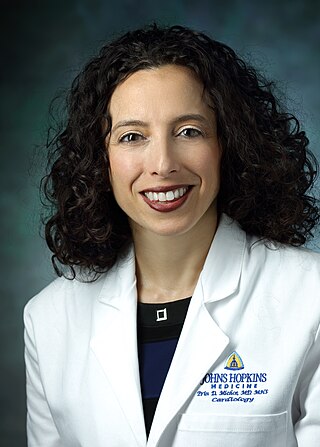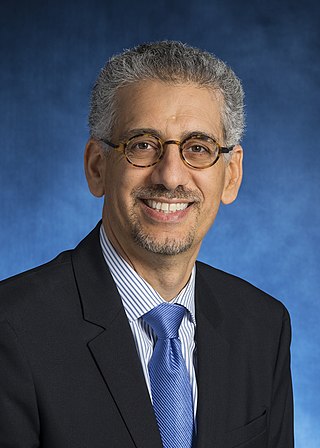Related Research Articles

C-reactive protein (CRP) is an annular (ring-shaped) pentameric protein found in blood plasma, whose circulating concentrations rise in response to inflammation. It is an acute-phase protein of hepatic origin that increases following interleukin-6 secretion by macrophages and T cells. Its physiological role is to bind to lysophosphatidylcholine expressed on the surface of dead or dying cells in order to activate the complement system via C1q.

The Medical Research Council (MRC) is responsible for co-coordinating and funding medical research in the United Kingdom. It is part of United Kingdom Research and Innovation (UKRI), which came into operation 1 April 2018, and brings together the UK's seven research councils, Innovate UK and Research England. UK Research and Innovation is answerable to, although politically independent from, the Department for Business, Energy and Industrial Strategy.

The Wellcome Trust is a charitable foundation focused on health research based in London, United Kingdom. It was established in 1936 with legacies from the pharmaceutical magnate Henry Wellcome to fund research to improve human and animal health. The aim of the Trust is to "support science to solve the urgent health challenges facing everyone." It had a financial endowment of £29.1 billion in 2020, making it the fourth wealthiest charitable foundation in the world. In 2012, the Wellcome Trust was described by the Financial Times as the United Kingdom's largest provider of non-governmental funding for scientific research, and one of the largest providers in the world. According to their annual report, the Wellcome Trust spent GBP £1.1 billion on charitable activities across their 2019/2020 financial year. According to the OECD, the Wellcome Trust's financing for 2019 development increased by 22% to US$327 million.

The Framingham Heart Study is a long-term, ongoing cardiovascular cohort study of residents of the city of Framingham, Massachusetts. The study began in 1948 with 5,209 adult subjects from Framingham, and is now on its third generation of participants. Prior to the study almost nothing was known about the epidemiology of hypertensive or arteriosclerotic cardiovascular disease. Much of the now-common knowledge concerning heart disease, such as the effects of diet, exercise, and common medications such as aspirin, is based on this longitudinal study. It is a project of the National Heart, Lung, and Blood Institute, in collaboration with Boston University. Various health professionals from the hospitals and universities of Greater Boston staff the project.

The Wellcome Sanger Institute, previously known as The Sanger Centre and Wellcome Trust Sanger Institute, is a non-profit British genomics and genetics research institute, primarily funded by the Wellcome Trust.

Paul M. Ridker is a cardiovascular epidemiologist and biomedical researcher. He is currently the Eugene Braunwald Professor of Medicine at Harvard University and Brigham and Women's Hospital, where he directs the Center for Cardiovascular Disease Prevention. Ridker also holds an appointment as Professor in the Department of Epidemiology at the Harvard T.H. Chan School of Public Health.
The Baker Heart and Diabetes Institute, commonly known as the Baker Institute, is an Australian independent medical research institute headquartered in Melbourne, Victoria. Established in 1926, the institute is one of Australia's oldest medical research organisations with a historical focus on cardiovascular disease. In 2008, it became the country's first medical research institute to target diabetes, heart disease, obesity and their complications at the basic, clinical and population health levels.

K. Srinath Reddy is an Indian physician and the Former President of the Public Health Foundation of India and formerly headed the Department of Cardiology at All India Institute of Medical Sciences (AIIMS).

Hugh Christian Watkins is a British cardiologist. He is a Fellow of Merton College, Oxford, an associate editor of Circulation Research, and was Field Marshal Alexander Professor of Cardiovascular Medicine in the University of Oxford between 1996 and 2013.
Eleftheria Zeggini is a director of the institute of translational genomics in Helmholtz Zentrum München and a professor at the Technical University of Munich (TUM). Previously she served as a research group leader at the Wellcome Trust Sanger Institute from 2008 to 2018 and an honorary professor in the department of health sciences at the University of Leicester in the UK.
Simin Liu is an American physician-scientist and epidemiologist. He is recognized internationally for his leadership in the research of nutrition, genetics, epidemiology, and the environmental and biological determinants of complex diseases, particularly those related to cardiometabolic health in diverse populations. His research has pioneered novel concepts, uncovered critical mechanisms and risk factors, and developed research frameworks for diabetes and cardiovascular diseases. A hallmark of Liu's work is when his lab was among the first to define and quantify dietary glycemic load in humans, providing key insights into the functional role of dietary carbohydrates in the development of health outcomes. This novel nutritional concept has since become a cornerstone of clinical diabetes management, nutritional epidemiology, and dietary feeding trials in diverse populations worldwide.
Karen A. Matthews is an American health psychologist known for her research on the epidemiology and risk factors associated with cardiovascular disease, early signs of coronary heart disease risk in children, women's health and menopause, and connections between socioeconomic status and health. She is Distinguished Professor Emerita of Psychiatry and Professor Emerita of Psychology and Epidemiology at the University of Pittsburgh.
Shoumo Bhattacharya is an Indian medical doctor and academic, and the British Heart Foundation (BHF) Professor of Cardiovascular Medicine at the BHF Centre of Research Excellence, University of Oxford.
Sharon Jayne Peacock is a British microbiologist who is Professor of Public Health and Microbiology in the Department of Medicine at the University of Cambridge, and Master of Churchill College, Cambridge.

Nicole Soranzo is an Italian-British senior group leader in human genetics at the Wellcome Sanger Institute, Professor of Human Genetics at the University of Cambridge. She is an internationally recognised Human Geneticist who has focused on the application of cutting edge genomic technologies to study the spectrum of human genetic variation associated with cardio-metabolic and immune diseases. She has led many large-scale discovery efforts including more than 1,000 novel genetic variants associated with cardio-metabolic diseases and their risk factors as well as establishing the HaemGen consortium, which is a worldwide effort to discover genetic determinants of blood cell formation and also interpretation of the downstream consequences of sequence variation through a host of integrative analyses and functional approaches.
Deborah A. Lawlor is a British epidemiologist and professor at the University of Bristol, where she is the deputy director of the Medical Research Council Integrative Epidemiology Unit. She is also a fellow of the Faculty of Public Health and of the Academy of Medical Sciences. Her main areas of research are perinatal, reproductive and cardio-metabolic health. Lawlor was awarded a CBE in the 2017 Queen's Birthday Honours for her services to social and community medicine research.

Erin Kathleen Donnelly Michos is an American cardiologist. She is an associate professor of Medicine and Director of Women's Cardiovascular Health at Johns Hopkins School of Medicine. Michos is also an Associate Faculty of the Welch Center for Prevention, Epidemiology and Clinical Research at Johns Hopkins, and has a joint faculty appointment in the Department of Epidemiology at the Johns Hopkins Bloomberg School of Public Health.

Josef Coresh is an American epidemiologist. He is the Terry and Mel Karmazin Professor of Population Health, a Professor in the Department of Medicine, and the Founding Director of the Optimal Aging Institute at NYU Langone Health. He was previously the inaugural George W. Comstock Professor in the Department of Epidemiology at Johns Hopkins University, and the director of both the Cardiovascular Epidemiology Training Program and the George W. Comstock Center for Public Health Research and Prevention at Johns Hopkins School of Medicine.
Patrick Francis Chinnery is a neurologist, clinician scientist, and Wellcome Trust Principal Research Fellow based in the Medical Research Council Mitochondrial Biology Unit and the University of Cambridge, where he is also professor of neurology and head of the department of clinical neurosciences.
Jeemon Panniyammakal is a faculty member in the Achutha Menon Centre for Health Science Studies (AMCHSS) in Sree Chitra Tirunal Institute for Medical Sciences and Technology, Thiruvananthapuram, Kerala, India. Jeemon Panniyammakal has made significant contributions to public health in general and in particular to prevention and control of cardiovascular diseases and diabetes in India. He was awarded the Shanti Swarup Bhatnagar Prize for Science and Technology in Medical Sciences in the year 2021 for his contributions to public health. In his research, he has been supported with grants from several global organisations including Wellcome Trust, Medical Research Council (UK), National Health and Medical Research Council (Australia), National Institutes of Health (USA) and International Diabetes Federation.
References
- 1 2 3 "John Danesh". Cambridge Institute of Public Health. Archived from the original on 22 December 2015. Retrieved 15 December 2015.
- ↑ "New Fellows 2015". The Academy of Medical Sciences. 11 May 2015. Retrieved 15 December 2015.
- ↑ "John Danesh". British Heart Foundation. Retrieved 11 October 2021.
- ↑ "Danesh, John - Wellcome Sanger Institute". www.sanger.ac.uk. Retrieved 9 February 2022.
- ↑ "Professor John Danesh". The Rhodes Trust. Retrieved 15 December 2015.
- ↑ "Professor John Danesh, Associate Faculty". Wellcome Trust Sanger Institute. Retrieved 15 December 2015.
- ↑ Danesh, J; Wheeler, JG; Hirschfield, GM; Eda, S; Eiriksdottir, G; Rumley, A; Lowe, GD; Pepys, MB; Gudnason, V (1 April 2004). "C-reactive protein and other circulating markers of inflammation in the prediction of coronary heart disease". The New England Journal of Medicine. 350 (14): 1387–97. doi: 10.1056/NEJMoa032804 . PMID 15070788.